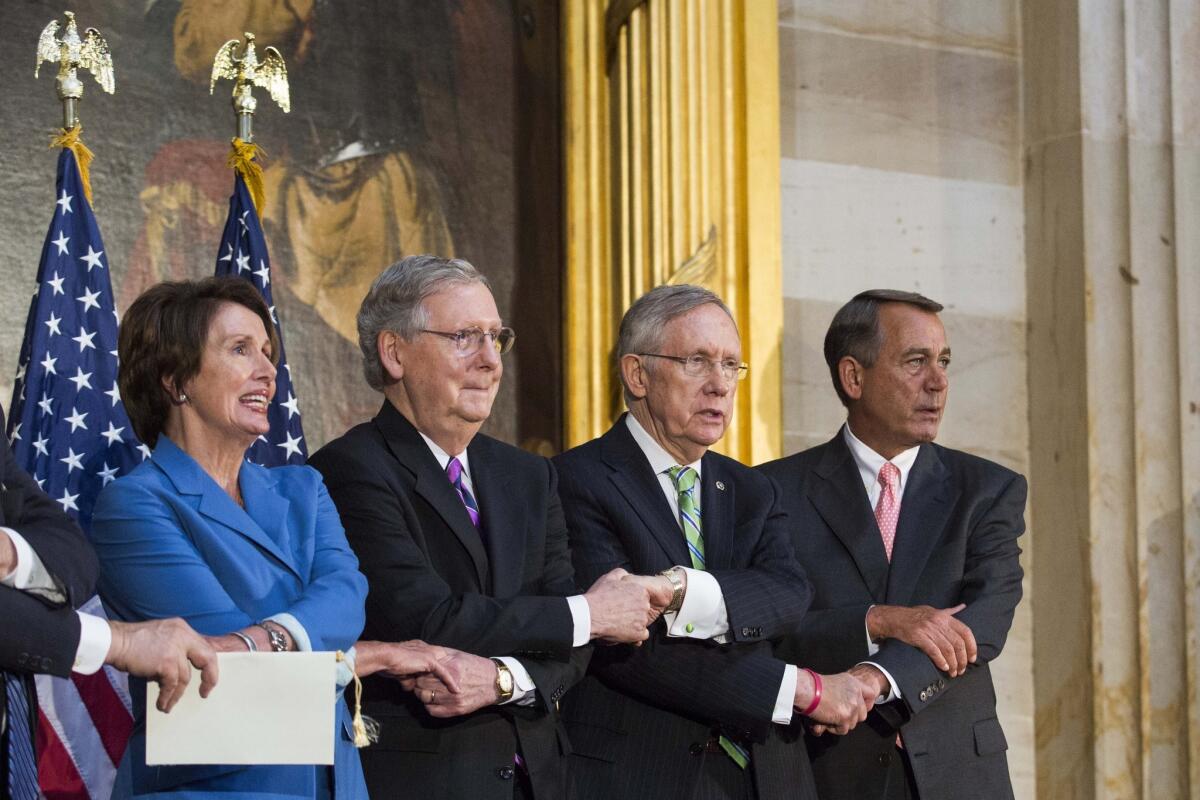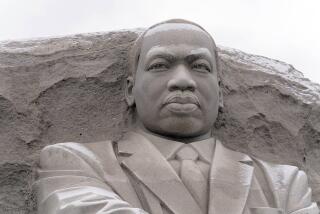Lawmakers join to honor MLK Jr., but are split over voting rights bill

- Share via
Reporting from Washington — Members of Congress joined in a rare moment of unity Tuesday on Capitol Hill.
Leaders linked hands and gently swayed together to the tune of “We Shall Overcome” during the Congressional Gold Medal Ceremony.
The ceremony, to commemorate the 50th anniversary of the Civil Rights Act of 1964, honored the late Rev. Martin Luther King Jr. and his wife, Coretta Scott King.
“Our nation owes a debt of gratitude to your father and mother that can never be repaid,” Sen. Carl Levin (D-Mich.) told King’s children, Martin Luther King III, Dexter Scott King and Bernice King, who accepted the award on their parents’ behalf.
------------
FOR THE RECORD
June 25, 9:35 a.m.: An earlier version of this post identified a UC Irvine law professor as Rich Hansen. His name is Rick Hasen.
------------
House Speaker John A. Boehner (R-Ohio), House Minority Leader Nancy Pelosi (D-Calif.), Senate Majority Leader Harry Reid (D-Nev.) and Senate Minority Leader Mitch McConnell (R-Ky.) delivered remarks at the ceremony.
Levin, Rep. Marcia Fudge (D-Ohio) and Rep. John Lewis (D-Ga.) also joined the leaders to honor the Kings.
But even though the congressional leaders held hands in King’s memory, they remain divided on pending legislation aimed at strengthening voting rights for African Americans.
Pelosi, Levin and Fudge, who is chairwoman of the Congressional Black Caucus, called upon their colleagues to pass a proposal to restore a key provision of the Voting Rights Act that was struck down last year by the U.S. Supreme Court.
“If the Rev. and Mrs. King could speak to us now, if our predecessors who passed the Civil Rights Act could speak to us now, would they not challenge us to come together across lines of party and geography in a great cause?” Levin asked.
The Voting Rights Act provision that was invalidated had allowed the federal government to require preapproval before some states could amend their election rules. It was aimed largely at Southern states to prevent voting laws that discriminated against African Americans.
New voting restrictions are slated to be in place in 22 states by the 2014 midterm election, according to New York University’s Brennan Center for Justice. Seven of 11 states with the highest African American turnout are imposing regulations, according to the report.
A bipartisan proposal introduced in January would essentially restore that section and create new criteria to determine which states need federal “preclearance” before changing their laws.
But many House Republicans have opposed the bill, according to Rick Hasen, a law professor at UC Irvine and election law blogger. He called the remarks at Tuesday’s ceremony “lofty rhetoric.”
“There’s no one who has the interest or the power to move this in the House, even if it passes the Senate,” Hasen said. “This is an issue people are going to continue to push going into the 2016 elections.”
More to Read
Sign up for Essential California
The most important California stories and recommendations in your inbox every morning.
You may occasionally receive promotional content from the Los Angeles Times.













